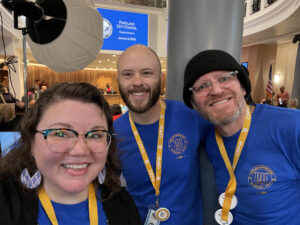After months of City feet dragging and City technology issues, interim dues is launching! This is a huge step forward in building our union – thank you for your patience and your commitment to winning a strong contract!
Interim dues will be automatically deducted from your March 21st, 2024 paycheck and will continue to be deducted from each paycheck until a contract is ratified. (Note: This applies to those who have signed a membership card and have authorized dues to be deducted. Membership gives benefits like voting rights, etc. We encourage all eligible City employees to become members to have the full rights and privileges of CPPW membership.)
Frequently Asked Questions
Why do we pay dues?
Dues are a crucial part of having a strong union – they allow us to pay for needed expenses, maintain an infrastructure, get the trainings we need to fight at the contract table, and have the resources to exercise our power. Most importantly, dues paying membership demonstrates to the City that CPPW members support the union effort and are ready to back up that support with action!
What are CPPW dues right now (aka, Interim Dues)?
In early December 2023, with a vote of 91% in favor, the CPPW membership voted to institute flat interim dues of 0.5% of gross monthly salary as a temporary measure to raise money to fight for our first contract.
How to I figure out my Interim Dues cost?
Base hourly wage (no overtime and before taxes or any pay enhancements) x .005
For example, if you make $50 an hour
$50x.005=0.25
Or 25 cents an hour
.25×80 hours a pay check = $20 in dues per pay check
What will dues be once we have a contract?
Great question – check out this website page of all things dues!
How can I contribute to my union through dues?
Sign your union card now! Signing your union card is a commitment to pay dues and allow automatic dues deduction on your paycheck.
What if I need to stop paying dues?
You may need to stop contributing because of a financial crisis or some other reason, we understand! You must submit your request for a hardship exception or a request to revoke your membership card in writing to info@cppwunion.org 10 days before pay day so that both CPPW and the City can fully process your request. (That’s the Monday before timesheets are due).

